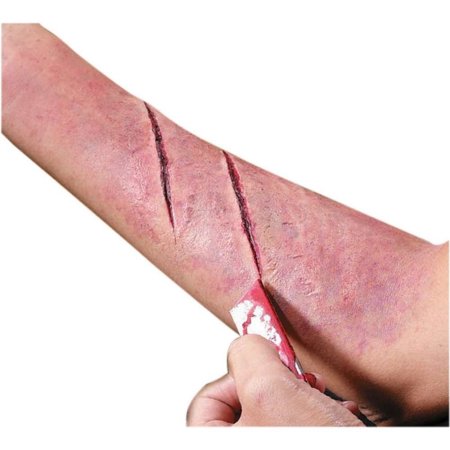
Liza Long’s son at age 4
(10-24-16) In a telephone conversation this morning with Alisa Bernard, director of advocacy for the International Bipolar Foundation, executives at Rubies Costume Company agreed to stop selling and to remove from its catalog the Razor Blade Suicide Scar Wound Latex Costume Make Up kit.
A regular reader of this blog, Alisa said executives expressed shock this morning when they arrived at their New York offices and found a barrage of complaints sent over the weekend because of this blog.
“Rubies has joined Walmart in dropping the product,” Alisa reported. “They were very apologetic.”

Does this put an end to Halloween outfits and accessories that marginalize individuals with mental illnesses? Of course not. But I hope that your willingness to complain has caused top executives at both outlets to rethink products that stigmatize individuals dealing with mental disorders.
Thank you for raising your voice and thanks Alisa for making that call.
I’m not the only advocate who is trying to educate the public and company officials. The Mighty website and several blogger friends also joined in this campaign.
My friend and blogger, Liz Long, also published a blog last week that I want to share with you.
Stop Profiting from Pain By Liza Long
Walmart’s suicide costume is an affront to decency and morality
“Why do you tear me?
Is there no pity left in any soul?”
Dante’s Inferno Canto VIII, John Ciardi trans.
I’ll never forget the first time my child talked about suicide. He was four years old, sniffling and shivering after a several-hour fit of thrashing, incoherent rage. As I rubbed his white-down hair and cuddled him, he said, “Mom, I don’t want to be anymore. I just want to be a zero.”
Nine years later, when I finally learned my son’s diagnosis, bipolar disorder, after years of specialists, hospitals, tests, medications, juvenile detention, and ongoing suicidal ideation, I was relieved. I knew people who lived with this illness and managed to have successful, happy lives. In fact, one of my closest friends from childhood, diagnosed with bipolar disorder in college, had married a wonderful man, raised four children, worked as a librarian and historian, and was writing her sixth novel.
Many of the 10 million people[i] in America who are diagnosed with severe mental illness can live healthy, happy, productive lives. But instead of celebrating their bravery, our society stigmatizes their illness by mocking it in horribly offensive ways.
There’s no time of year mental health advocates dread more than Halloween.
Every single year, it’s the same thing. Mental illness becomes the punchline of a joke, or the theme of a horror attraction. This year, Knott’s Berry Farm and Six Flags did the right thing, shutting down their horrific asylum-themed virtual reality attractions when advocates expressed justified outrage. A representative from Six Flags explained the company’s decision to me in an email: “This is a good lesson for us all about perpetuating stereotypes, and we apologize to anyone that we may have offended.”
This is a lesson that Walmart, the nation’s largest retailer, desperately needs to learn. A picture of a “razor blade suicide scar wound latex costume make up” (I won’t link to it, because it is a real trigger) is the latest and most egregious example of the ongoing battles people with mental illness and their loved ones must face to educate the public about the reality of mental health conditions.
Imagine if I told you that my child had an incurable illness with a risk of death as high as 20% [ii] If I told you that the illness in question was cancer, you’d be bringing my family casseroles, organizing community bake sales, and demanding that your legislators provide more funding for research and treatments.
You’d be outraged by my inability to access quality medical care for my child. And you would be furiously calling for a boycott if a major retailer released a Halloween costume called “bald head cancer patient latex costume make up.”
But when I tell you my child’s illness is bipolar disorder, you back away. The risks and challenges are the same (I know—my father died from cancer when I was in college). But when I and other advocates express our outrage about suicide costumes and asylum-themed attractions, you tell us, “Stop being so politically correct,” or “Can’t you just take a joke?”
No, I can’t just take a joke. To those who don’t understand why this is all so wrong, I say in all sincerity, I’m glad you don’t. I am glad that you have never lost a child, or a parent, or a spouse, or a sister or brother or close friend to a choice-stealing brain disease. Because the pain of that loss never heals.
And I’m glad that you have never had to walk through the valley of the shadow of death, to come out the other side a survivor, but still struggling in a society that thinks your illness is “a joke.”
Our pain—and our loved ones’ pain—should never be used for entertainment or profit. If you think that I am just too thin-skinned—that I can’t take a joke—I have a Halloween costume idea for you. Go as yourself. You scare me.



